Charles E W Bean, Diaries, AWM38 3DRL 606/255/1 - 1916 - 1937 - Part 11
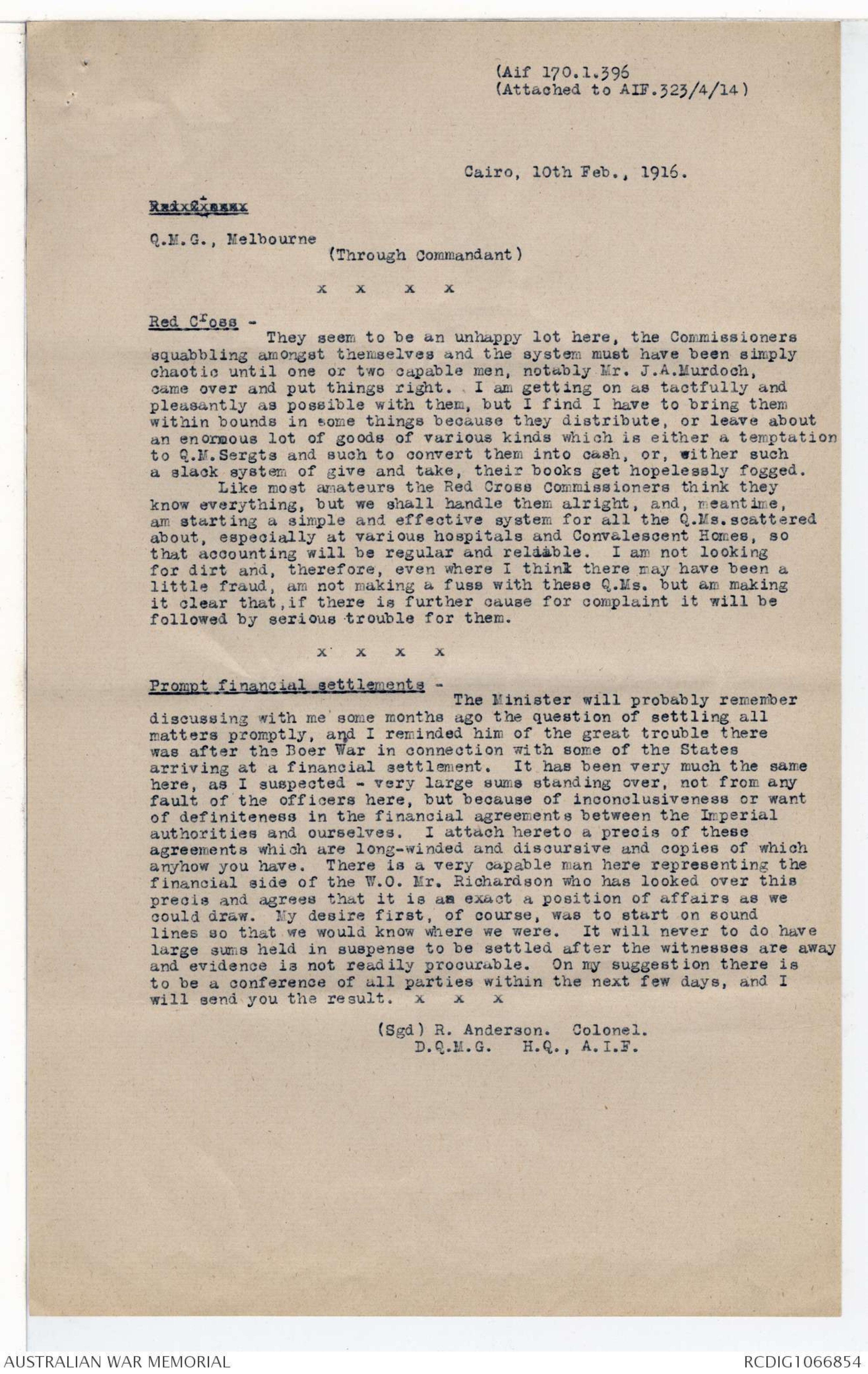
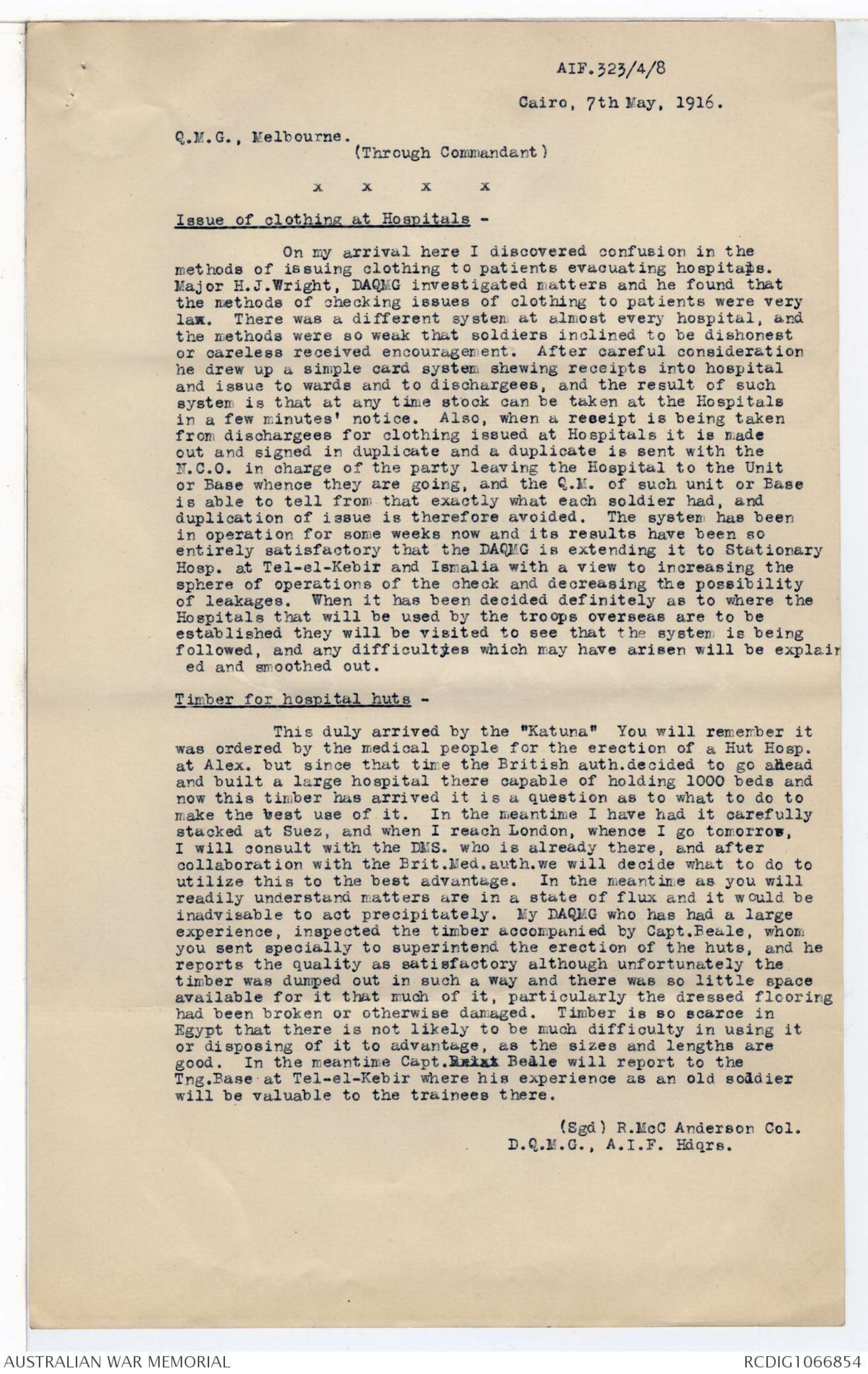
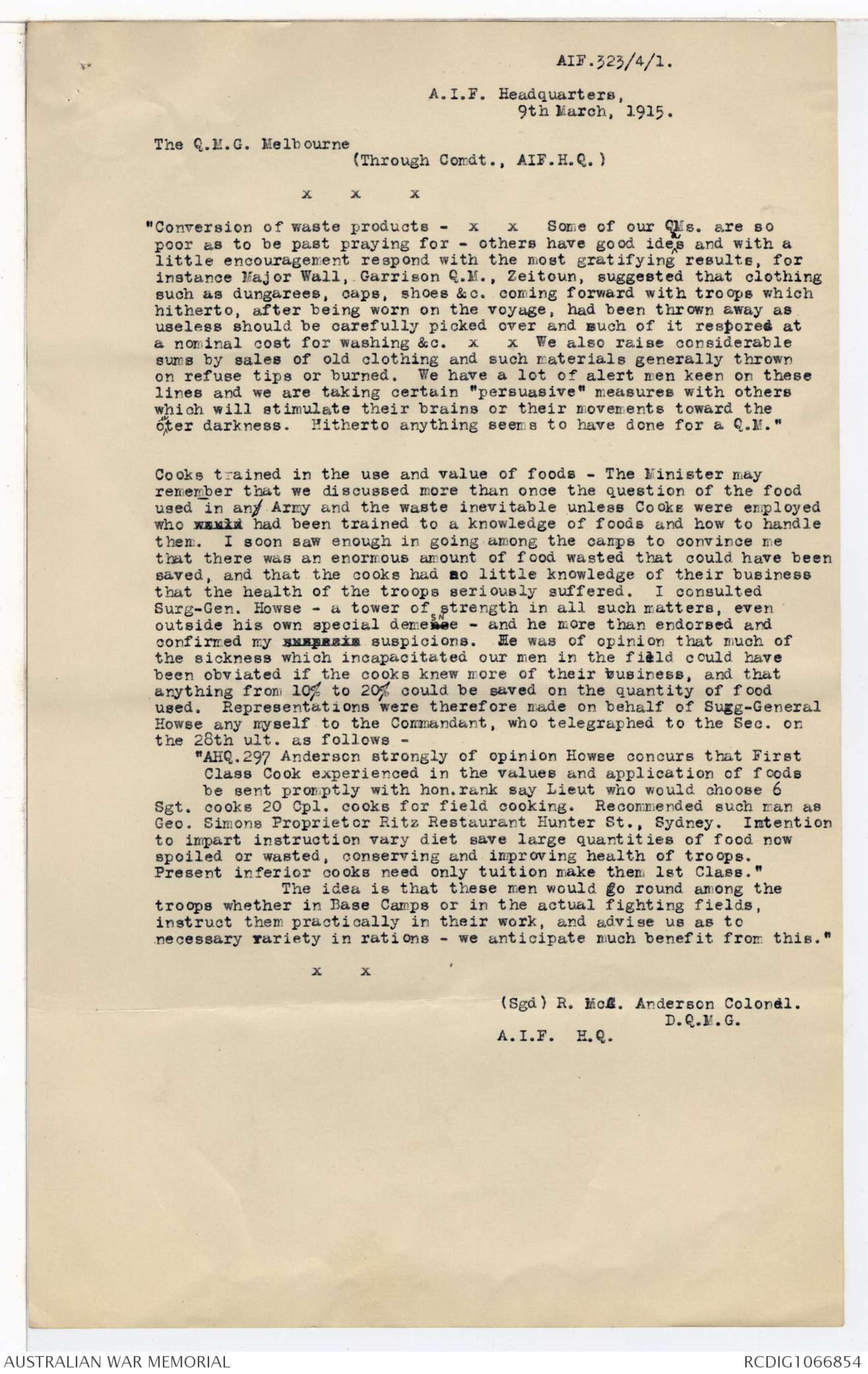
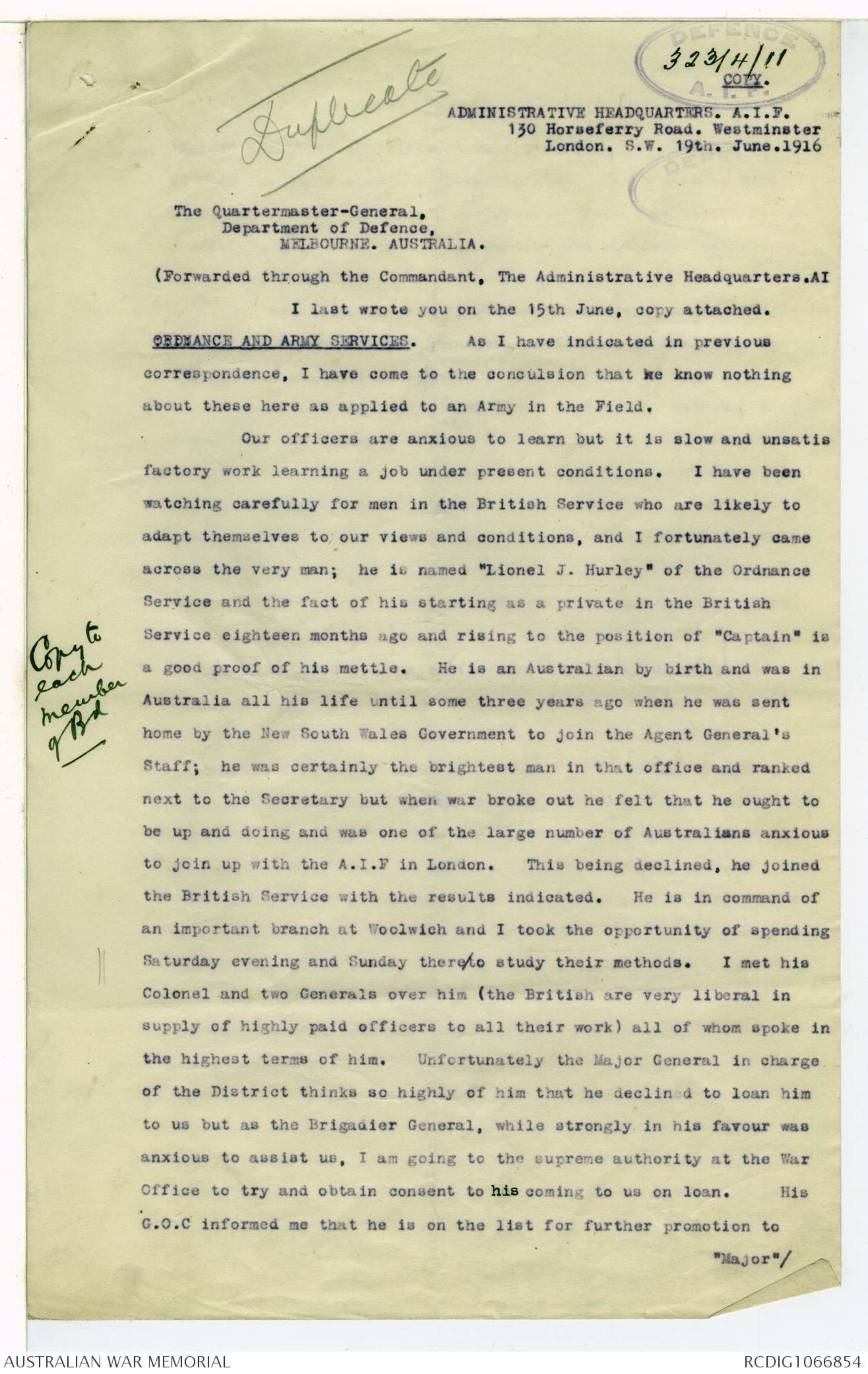
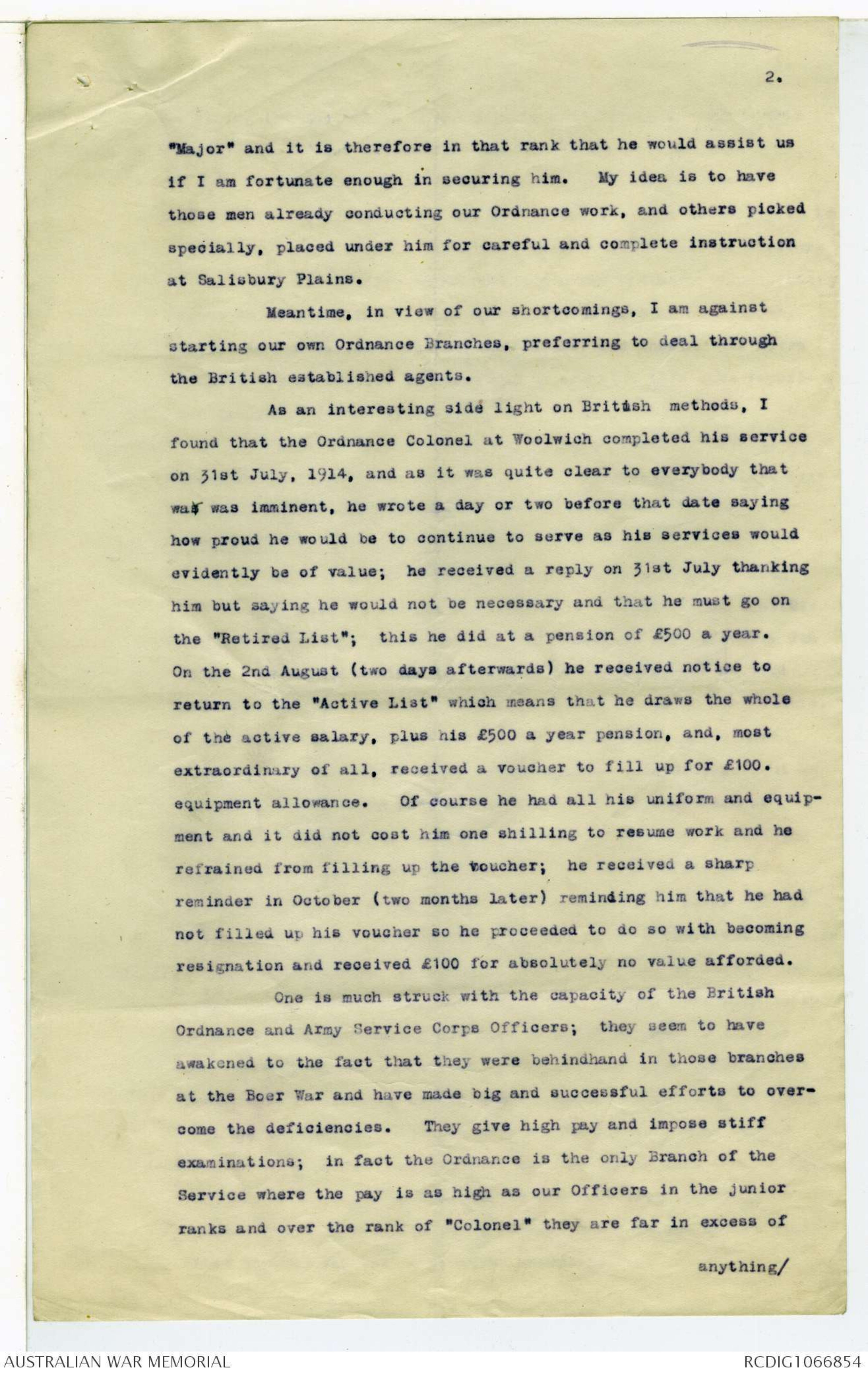
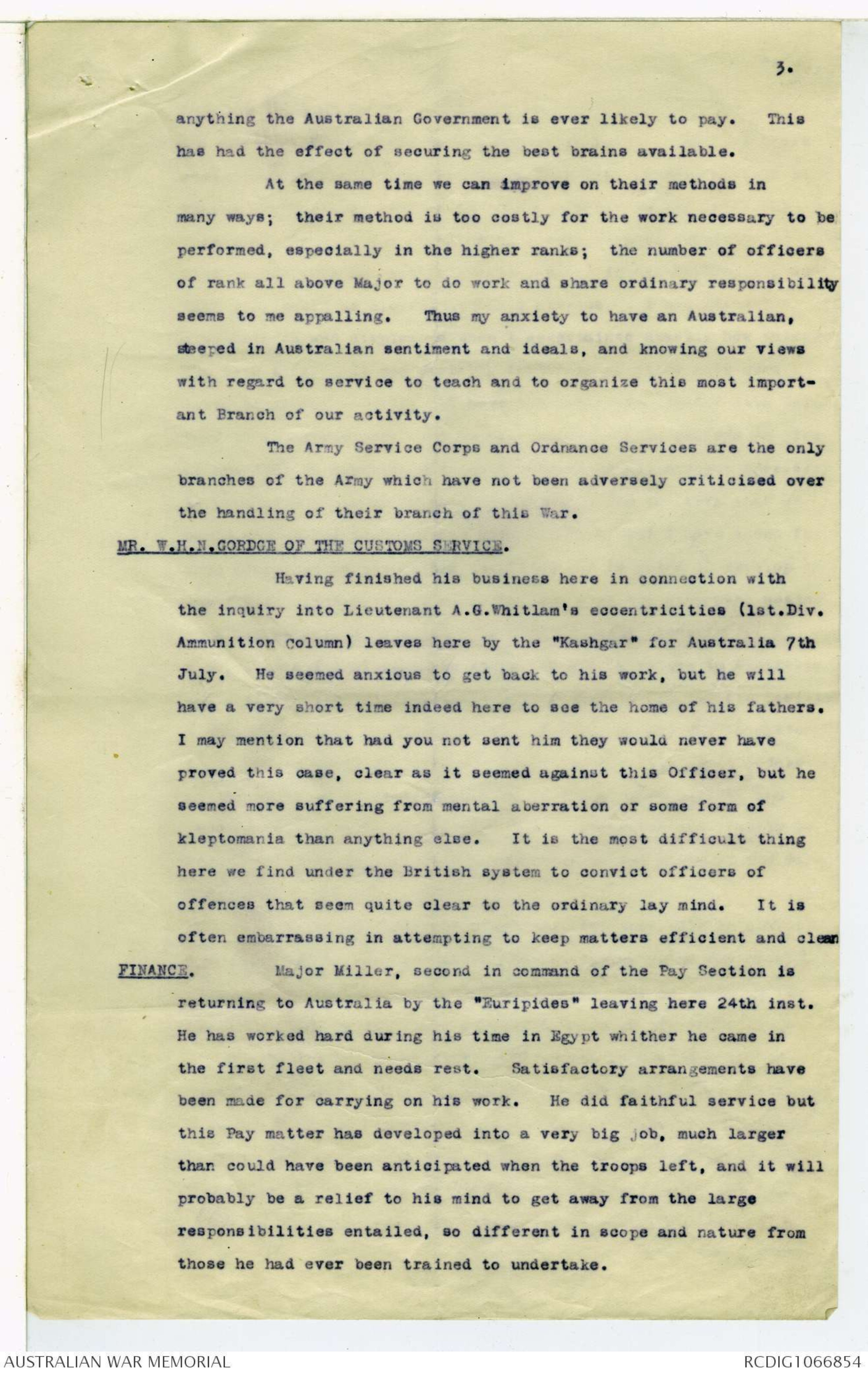
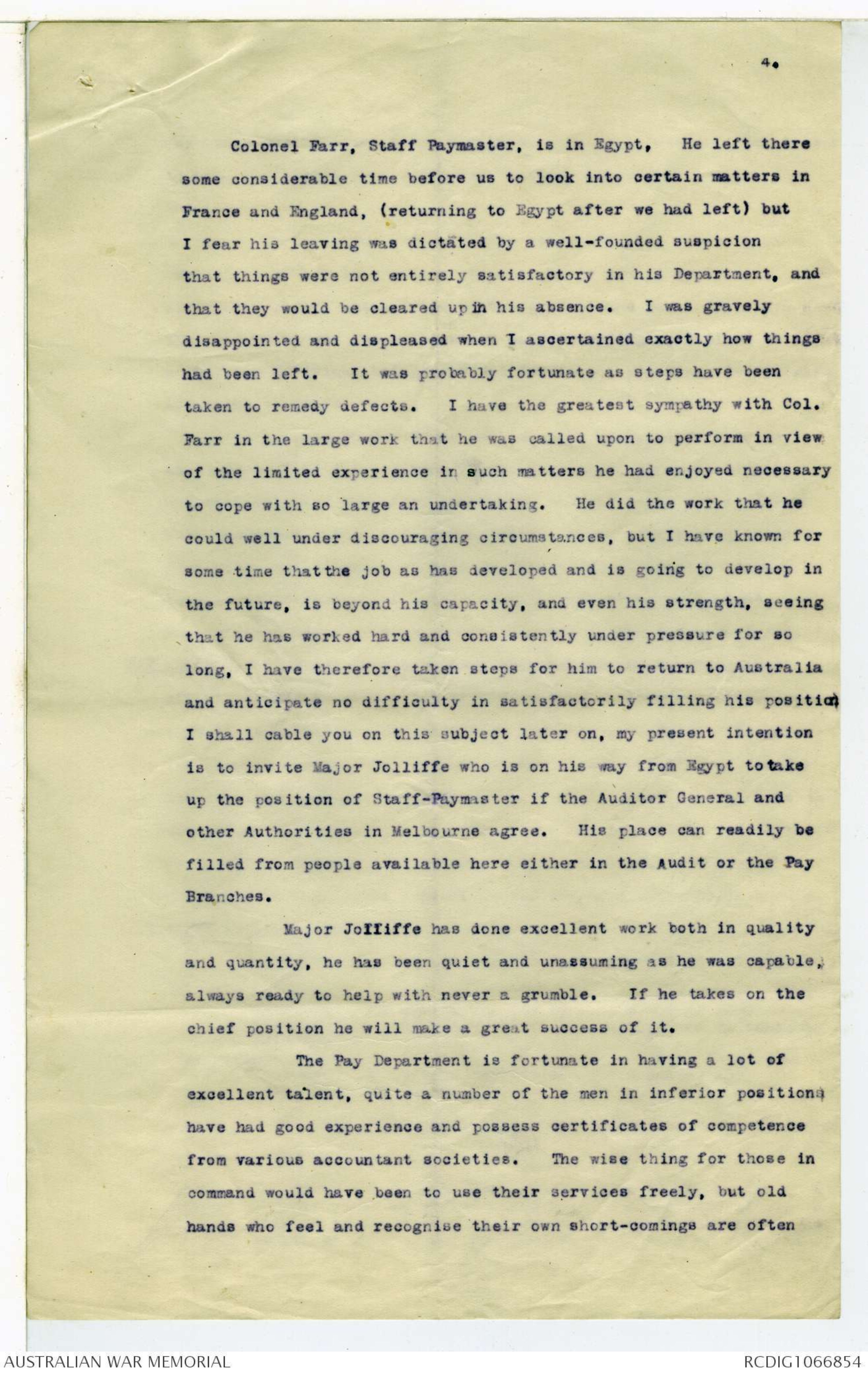
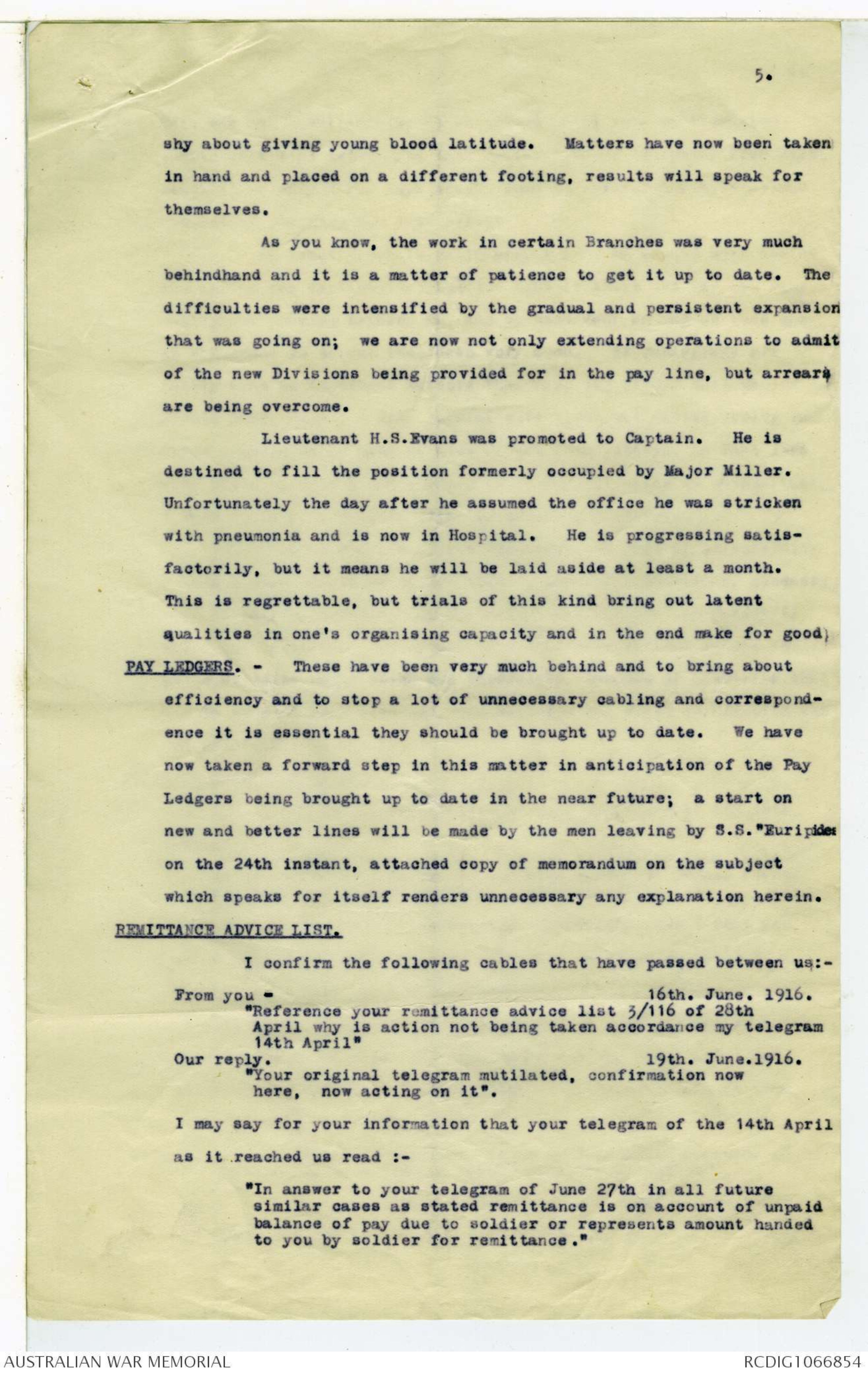
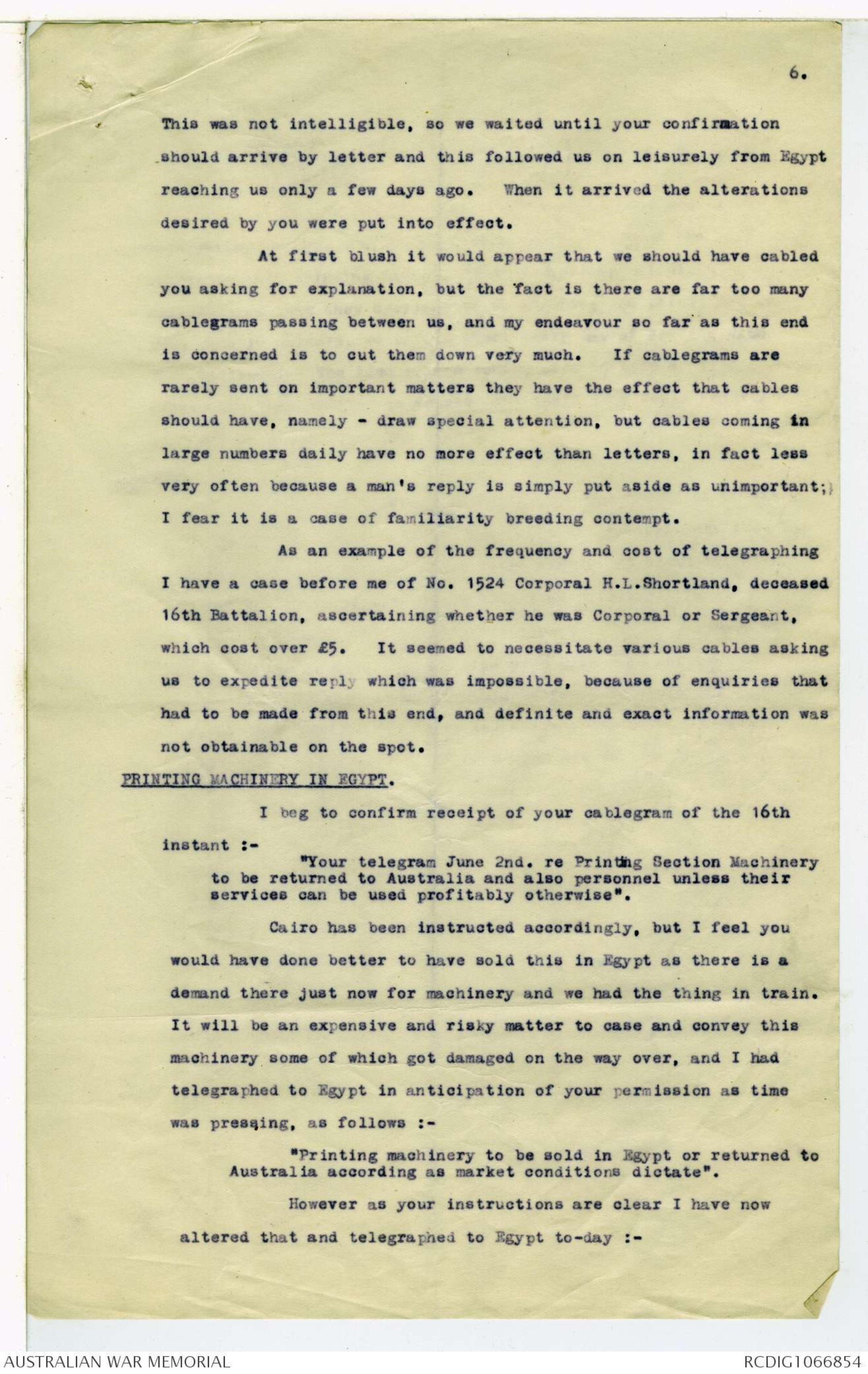
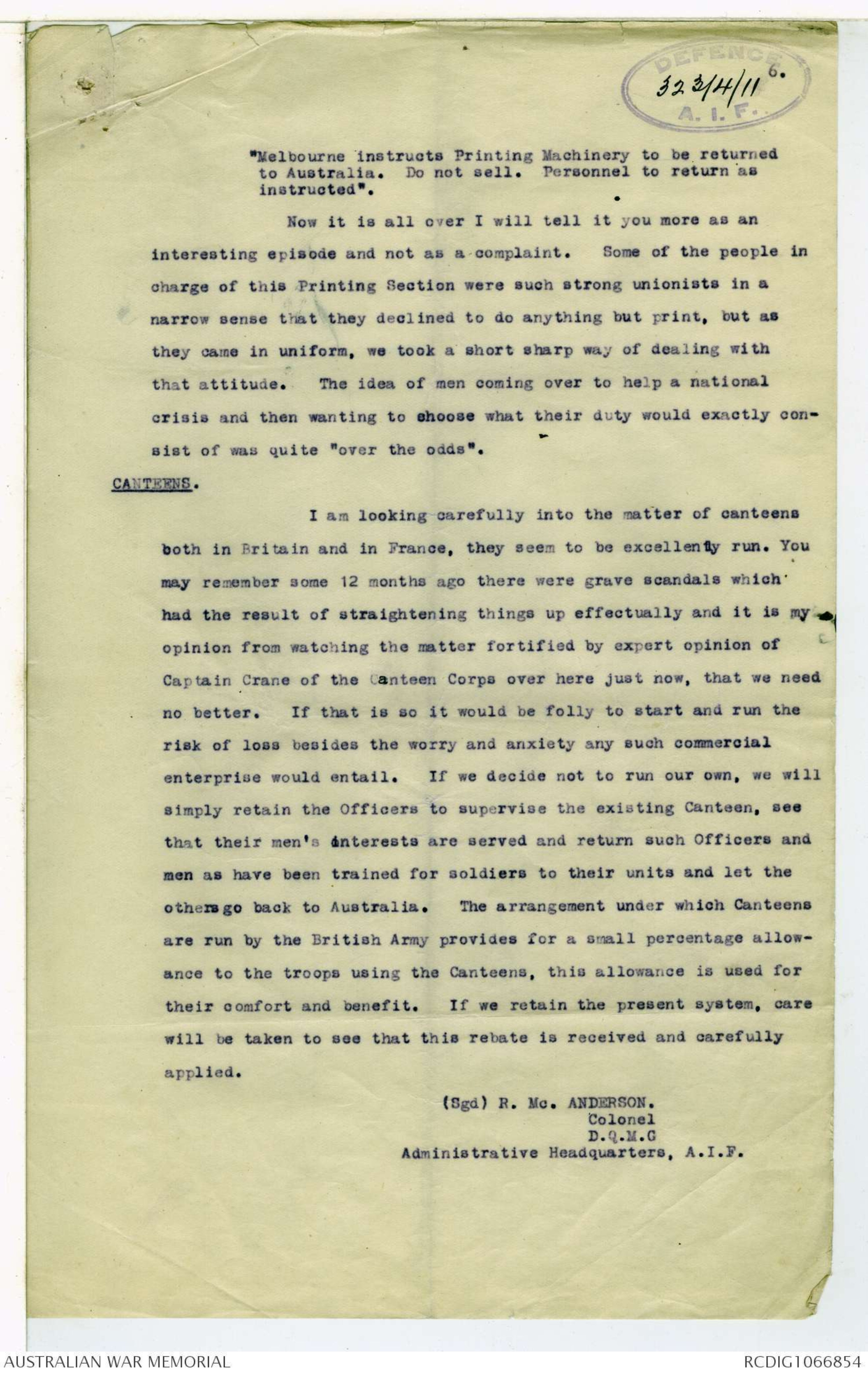
(Aif 170.1.396
(Attached to AIF.323/4/14)
Cairo, 10th Feb., 1916.xxxxxxxxxx
Q.M.G., Melbourne
(Through Commandant)
x x x x
Red Cross -
They seem to be an unhappy lot here, the Commissioners
squabbling amongst themselves and the system must have been simply
chaotic until one or two capable men, notably Mr. J.A.Murdoch,
came over and put things right. I am getting on as tactfully and
pleasantly as possible with them, but I find I have to bring them
within bounds in some things because they distribute, or leave about
an enormous lot of goods of various kinds which is either a temptation
to Q.M.Sergts and such to convert them into cash, or, wither such
a slack system of give and take, their books get hopelessly fogged.
Like most amateurs the Red Cross Commissioners think they
know everything, but we shall handle them alright, and, meantime,
am starting a simple and effective system for all the Q.Ms.scattered
about, especially at various hospitals and Convalescent Homes, so
that accounting will be regular and reliable. I am not looking
for dirt and, therefore, even where I think there may have been a
little fraud, am not making a fuss with these Q.Ms. but am making
it clear that, if there is further cause for complaint it will be
followed by serious trouble for them.
x x x x
Prompt financial settlements -
The Minister will probably remember
discussing with me some months ago the question of settling all
matters promptly, and I reminded him of the great trouble there
was after the Boer War in connection with some of the States
arriving at a financial settlement. It has been very much the same
here, as I suspected - very large sums standing over, not from any
fault of the officers here, but because of inconclusiveness or want
of definiteness in the financial agreements between the Imperial
authorities and ourselves. I attach hereto a precis of these
agreements which are long-winded and discursive and copies of which
anyhow you have. There is a very capable man here representing the
financial side of the W.O. Mr. Richardson who has looked over this
precis and agrees that it is as exact a position of affairs as we
could draw. My desire first, of course, was to start on sound
lines so that we would know where we were. It will never to do have
large sums held in suspense to be settled after the witnesses are away
and evidence is not readily procurable. On my suggestion there is
to be a conference of all parties within the next few days, and I
will send you the result. x x x
(Sgd) R. Anderson. Colonel.
D.Q.M.G. H.Q., A.I.F.
AIF.323/4/8
Cairo, 7th May, 1916.
Q.M.G., Melbourne.
(Through Commandant)
x x x x
Issue of clothing at Hospitals -
On my arrival here I discovered confusion in the
methods of issuing clothing to patients evacuating hospitals.
Major H.J.Wright, DAQMC investigated matters and he found that
the methods of checking issues of clothing to patients were very
lax. There was a different system at almost every hospital, and
the methods were so weak that soldiers inclined to be dishonest
or careless received encouragement. After careful consideration
he drew up a simple card system shewing receipts into hospital
and issue to wards and to dischargees, and the result of such
system is that at any time stock can be taken at the Hospitals
in a few minutes' notice. Also, when a receipt is being taken
from dischargees for clothing issued at Hospitals it is made
out and signed in duplicate and a duplicate is sent with the
N.C.O. in charge of the party leaving the Hospital to the Unit
or Base whence they are going, and the C.M. of such unit or Base
is able to tell from that exactly what each soldier had, and
duplication of issue is therefore avoided. The system has been
in operation for some weeks now and its results have been so
entirely satisfactory that the DAQMC is extending it to Stationary
Hosp. at Tel-el-Kebir and Ismalia with a view to increasing the
sphere of operations of the check and decreasing the possibility
of leakages. When it has been decided definitely as to where the
Hospitals that will be used by the troops overseas are to be
established they will be visited to see that the system is being
followed, and any difficultyes which may have arisen will be explain
ed and smoothed out.
Timber for hospital huts -
This duly arrived by the "Katuna" You will remember it
was ordered by the medical people for the erection of a Hut Hosp.
at Alex. but since that time the British auth.decided to go ahead
and built a large hospital there capable of holding 1000 beds and
now this timber has arrived it is a question as to what to do to
make the best use of it. In the meantime I have had it carefully
stacked at Suez, and when I reach London, whence I go tomorrow,
I will consult with the DMS. who is already there, and after
collaboration with the Brit.Med.auth.we will decide what to do to
utilize this to the best advantage. In the meantime as you will
readily understand matters are in a state of flux and it would be
inadvisable to act precipitately. My DAQMG who has had a large
experience, inspected the timber accompanied by Capt.Beale, whom
you sent specially to superintend the erection of the huts, and he
reports the quality as satisfactory although unfortunately the
timber was dumped out in such a way and there was so little space
available for it that much of it, particularly the dressed flooring
had been broken or otherwise damaged. Timber is so scarce in
Egypt that there is not likely to be much difficulty in using it
or disposing of it to advantage, as the sizes and lengths are
good. In the meantime Capt.xxxxx Beale will report to the
Tng.Base at Tel-el-Kebir where his experience as an old soldier
will be valuable to the trainees there.
(Sgd) R.McC Anderson Col.
D.Q.M.C., A.I.F. Hdqrs.
AIF.323/4/1.
A.I.F. Headquarters,
9th March, 1915.
The Q.M.G. Melbourne
(Through Comdt., AIF.H.Q.)
x x x
"Conversion of waste products - x x Some of our QMs. are so
poor as to be past praying for - others have good ideas and with a
little encouragement respond with the most gratifying results, for
instance Major Wall, Garrison Q.M., Zeitoun, suggested that clothing
such as dungarees, caps, shoes &c. coming forward with troops which
hitherto, after being worn on the voyage, had been thrown away as
useless should be carefully picked over and such of it respored at
a nominal cost for washing &c. x x We also raise considerable
sums by sales of old clothing and such materials generally thrown
on refuse tips or burned. We have a lot of alert men keen on these
lines and we are taking certain "persuasive" measures with others
which will stimulate their brains or their movements toward the
o[*u*]ter darkness. Hitherto anything seems to have done for a Q.M."
Cooks trained in the use and value of foods - The Minister may
remember that we discussed more than once the question of the food
used in any Army and the waste inevitable unless Cooks were employed
who xxxxx had been trained to a knowledge of foods and how to handle
them. I soon saw enough in going among the camps to convince me
that there was an enormous amount of food wasted that could have been
saved, and that the cooks had so little knowledge of their business
that the health of the troops seriously suffered. I consulted
Surg-Gen. Howse - a tower of strength in all such matters, even
outside his own special demene[*sn*]e - and he more than endorsed and
confirmed my xxxxxxxx suspicions. He was of opinion that much of
the sickness which incapacitated our men in the field could have
been obviated if the cooks knew more of their business, and that
anything from 10% to 20% could be saved on the quantity of food
used. Representations were therefore made on behalf of Surg-General
Howse any myself to the Commandant, who telegraphed to the Sec. on
the 28th ult. as follows -
"AHQ.297 Anderson strongly of opinion Howse concurs that First
Class Cook experienced in the values and application of foods
be sent promptly with hon.rank say Lieut who would choose 6
Sgt. cooks 20 Cpl. cooks for field cooking. Recommended such man as
Geo. Simons Proprietor Ritz Restaurant Hunter St., Sydney. Intention
to impart instruction vary diet save large quantities of food now
spoiled or wasted, conserving and improving health of troops.
Present inferior cooks need only tuition make them 1st Class. "
The idea is that these men would go round among the
troops whether in Base Camps or in the actual fighting fields,
instruct them practically in their work, and advise us as to
necessary variety in rations - we anticipate much benefit from this."
x x
(Sgd) R. McC. Anderson Colonel.
D.Q.M.G.
A.I.F. H.Q.
DEFENCE
323/4/11
COPY.
[*Duplicate*]
ADMINISTRATIVE HEADQUARTERS. A.I.F.
130 Horseferry Road. Westminster
London. S.W. 19th. June.1916
The Quartermaster-General,
Department of Defence,
MELBOURNE. AUSTRALIA.
(Forwarded through the Commandant, The Administrative Headquarters.AI
I last wrote you on the 15th June, copy attached.
ORDNANCE AND ARMY SERVICES. As I have indicated in previous
correspondence, I have come to the conculsion that we know nothing
about these here as applied to an Army in the Field.
Our officers are anxious to learn but it is slow and unsatis
factory work learning a job under present conditions. I have been
watching carefully for men in the British Service who are likely to
adapt themselves to our views and conditions, and I fortunately came
across the very man; he is named "Lionel J. Hurley" of the Ordnance
[*Copy to
each
member
9 Bd*]
Service and the fact of his starting as a private in the British
Service eighteen months ago and rising to the position of "Captain" is
a good proof of his mettle. He is an Australian by birth and was in
Australia all his life until some three years ago when he was sent
home by the New South Wales Covernment to join the Agent General's
Staff; he was certainly the brightest man in that office and ranked
next to the Secretary but when war broke out he felt that he ought to
be up and doing and was one of the large number of Australians anxious
to join up with the A.I.F in London. This being declined, he joined
the British Service with the results indicated. He is in command of
an important branch at Woolwich and I took the opportunity of spending
Saturday evening and Sunday there to study their methods. I met his
Colonel and two Generals over him (the British are very liberal in
supply of highly paid officers to all their work) all of whom spoke in
the highest terms of him. Unfortunately the Major General in charge,
of the District thinks so highly of him that he declined to loan him
to us but as the Brigadier Ceneral, while strongly in his favour was
anxious to assist us, I am going to the supreme authority at the War
Office to try and obtain consent to his coming to us on loan. His
C.O.C informed me that he is on the list for further promotion to
"Major"/
2.
"Major" and it is therefore in that rank that he would assist us
if I am fortunate enough in securing him. My idea is to have
those men already conducting our Ordnance work, and others picked
specially, placed under him for careful and complete instruction
at Salisbury Plains.
Meantime, in view of our shortcomings, I am against
starting our own Ordnance Branches, preferring to deal through
the British established agents.
As an interesting side light on British methods, I
found that the Ordnance Colonel at Woolwich completed his service
on 31st July, 1914, and as it was quite clear to everybody that
way was imminent, he wrote a day or two before that date saying
how proud he would be to continue to serve as his services would
evidently be of value; he received a reply on 31st July thanking
him but saying he would not be necessary and that he must go on
the "Retired List"; this he did at a pension of £500 a year.
On the 2nd August (two days afterwards) he received notice to
return to the "Active List" which means that he draws the whole
of the active salary, plus his £500 a year pension, and, most
extraordinary of all, received a voucher to fill up for £100.
equipment allowance. Of course he had all his uniform and equip-
ment and it did not cost him one shilling to resume work and he
refrained from filling up the voucher; he received a sharp
reminder in October (two months later) reminding him that he had
not filled up his voucher so he proceeded to do so with becoming
resignation and received £100 for absolutely no value afforded.
One is much struck with the capacity of the British
Ordnance and Army Service Corps Officers; they seem to have
awakened to the fact that they were behindhand in those branches
at the Boer War and have made big and successful efforts to over-
come the deficiencies. They give high pay and impose stiff
examinations; in fact the Ordnance is the only Branch of the
Service where the pay is as high as our Officers in the junior
ranks and over the rank of "Colonel" they are far in excess of
anything/
3.
anything the Australian Government is ever likely to pay. This
has had the effect of securing the best brains available.
At the same time we can improve on their methods in
many ways; their method is too costly for the work necessary to be
performed, especially in the higher ranks; the number of officers
of rank all above Major to do work and share ordinary responsibility
seems to me appalling. Thus my anxiety to have an Australian,
steered in Australian sentiment and ideals, and knowing our views
with regard to service to teach and to organize this most import-
ant Branch of our activity.
The Army Service Corps and Ordnance Services are the only
branches of the Army which have not been adversely criticised over
the handling of their branch of this War.
MR. W.M.N.GORDGE OF THE CUSTOMS SERVICE.
Having finished his business here in connection with
the inquiry into Lieutenant A.G.Whitlam's eccentricities (1st.Div.
Ammunition Column) leaves here by the "Kashgar" for Australis 7th
July. He seemed anxious to get back to his work, but he will
have a very short time indeed here to see the home of his fathers.
I may mention that had you not sent him they would never have
proved this case, clear as it seemed against this Officer, but he
seemed more suffering from mental aberration or some form of
kleptomania than anything else. It is the most difficult thing
here we find under the British system to convict officers of
offences that seem quite clear to the ordinary lay mind. It is
often embarrassing in attempting to keep matters efficient and clean.
FINANCE. Major Miller, second in command of the Pay Section is
returning to Australia by the "Euripides" leaving here 24th inst.
He has worked hard during his time in Egypt whither he came in
the first fleet and needs rest. Satisfactory arrangements have
been made for carrying on his work. He did faithful service but
this Pay matter has developed into a very big job, much larger
than could have been anticipated when the troops left, and it will
probably be a relief to his mind to get away from the large
responsibilities entailed, so different in scope and nature from
those he had ever been trained to undertake.
4.
Colonel Farr, Staff Paymaster, is in Egypt. He left there
some considerable time before us to look into certain matters in
France and England, (returning to Egypt after we had left) but
I fear his leaving was dictated by a well-founded suspicion
that things were not entirely satisfactory in his Department, and
that they would be cleared up in his absence. I was gravely
disappointed and displeased when I ascertained exactly how things
had been left. It was probably fortunate as steps have been
taken to remedy defects. I have the greatest sympathy with Col.
Farr in the large work that he was called upon to perform in view
of the limited experience in such matters he had enjoyed necessary
to cope with so large an undertaking. He did the work that he
could well under discouraging circumstances, but I have known for
some time that the job as has developed and is going to develop in
the future, is beyond his capacity, and even his strength, seeing
that he has worked hard and consistently under pressure for so
long, I have therefore taken steps for him to return to Australia
and anticipate no difficulty in satisfactorily filling his position.
I shall cable you on this subject later on, my present intention
is to invite Major Jolliffe who is on his way from Egypt to take
up the position of Staff-Paymaster if the Auditor General and
other Authorities in Melbourne agree. His place can readily be
filled from people available here either in the Audit or the Pay
Branches.
Major Jolliffe has done excellent work both in quality
and quantity, he has been quiet and unassuming as he was capable,
always ready to help with never a grumble. If he takes on the
chief position he will make a great success of it.
The Pay Department is fortunate in having a lot of
excellent talent, quite a number of the men in inferior positions
have had good experience and possess certificates of competence
from various accountant societies. The wise thing for those in
command would have been to use their services freely, but old
hands who feel and recognise their own short-comings are often
5.
shy about giving young blood latitude. Matters have now been taken
in hand and placed on a different footing, results will speak for
themselves.
As you know, the work in certain Branches was very much
behindhand and it is a matter of patience to get it up to date. The
difficulties were intensified by the gradual and persistent expansion
that was going on; we are now not only extending operations to admit
of the new Divisions being provided for in the pay line, but arrears
are being overcome.
Lieutenant H.S.Evans was promoted to Captain. He is
destined to fill the position formerly occupied by Major Miller.
Unfortunately the day after he assumed the office he was stricken
with pneumonia and is now in Hospital. He is progressing satis-
factorily, but it means he will be laid aside at least a month.
This is regrettable, but trials of this kind bring out latent
qualities in one's organising capacity and in the end make for good
PAY LEDGERS. - These have been very much behind and to bring about
efficiency and to stop a lot of unnecessary cabling and correspond-
ence it is essential they should be brought up to date. We have
now taken a forward step in this matter in anticipation of the Pay
Ledgers being brought up to date in the near future; a start on
new and better lines will be made by the men leaving by S.S."Euripides"
on the 24th instant, attached copy of memorandum on the subject
which speaks for itself renders unnecessary any explanation herein.
REMITTANCE ADVICE LIST.
I confirm the following cables that have passed between us: –
From you – 16th. June. 1916.
"Reference your remittance advice list 3/116 of 28th
April why is action not being taken accordance my telegram
14th April"
Our reply. 19th. June.1916.
"Your original telegram mutilated, confirmation now
here, now acting on it".
I may say for your information that your telegram of the 14th April
as it reached us read : –
"In answer to your telegram of June 27th in all future
similar cases as stated remittance is on account of unpaid
balance of pay due to soldier or represents amount handed
to you by soldier for remittance."
6.
This was not intelligible, so we waited until your confirmation
should arrive by letter and this followed us on leisurely from Egypt
reaching us only a few days ago. When it arrived the alterations
desired by you were put into effect.
At first blush it would appear that we should have cabled
you asking for explanation, but the fact is there are far too many
cablegrams passing between us, and my endeavour so far as this end
is concerned is to cut them down very much. If cablegrams are
rarely sent on important matters they have the effect that cables
should have, namely – draw special attention, but cables coming in
large numbers daily have no more effect than letters, in fact less
very often because a man's reply is simply put aside as unimportant;
I fear it is a case of familiarity breeding contempt.
As an example of the frequency and cost of telegraphing
I have a case before me of No. 1524 Corporal H.L.Shortland, deceased
16th Battalion, ascertaining whether he was Corporal or Sergeant,
which cost over £5. It seemed to necessitate various cables asking
us to expedite reply which was impossible, because of enquiries that
had to be made from this end, and definite and exact information was
not obtainable on the spot.
PRINTING MACHINERY IN EGYPT.
I beg to confirm receipt of your cablegram of the 16th
instant : –
"Your telegram June 2nd. re Printing Section Machinery
to be returned to Australia and also personnel unless their
services can be used profitably otherwise".
Cairo has been instructed accordingly, but I feel you
would have done better to have sold this in Egypt as there is a
demand there just now for machinery and we had the thing in train.
It will be an expensive and risky matter to case and convey this
machinery some of which got damaged on the way over, and I had
telegraphed to Egypt in anticipation of your permission as time
was pressing, as follows : –
"Printing machinery to be sold in Egypt or returned to
Australia according as market conditions dictate".
However as your instructions are clear I have now
altered that and telegraphed to Egypt to-day : –
DEFENCE
323/4/11
A.I.F
"Melbourne instructs Printing Machinery to be returned
to Australia. Do not sell. Personnel to return as
instructed".
Now it is all over I will tell it you more as an
interesting episode and not as a complaint. Some of the people in
charge of this Printing Section were such strong unionists in a
narrow sense that they declined to do anything but print, but as
they came in uniform, we took a short sharp way of dealing with
that attitude. The idea of men coming over to help a national
crisis and then wanting to choose what their duty would exactly con-
sist of was quite "over the odds".
CANTEENS.
I am looking carefully into the matter of canteens
both in Britain and in France, they seem to be excellently run. You
may remember some 12 months ago there were grave scandals which
had the result of straightening things up effectually and it is my
opinion from watching the matter fortified by expert opinion of
Captain Crane of the Canteen Corps over here just now, that we need
no better. If that is so it would be folly to start and run the
risk of loss besides the worry and anxiety any such commercial
enterprise would entail. If we decide not to run our own, we will
simply retain the Officers to supervise the existing Canteen, see
that their men's interests are served and return such Officers and
men as have been trained for soldiers to their units and let the
others go back to Australia. The arrangement under which Canteens
are run by the British Army provides for a small percentage allow-
ance to the troops using the Canteens, this allowance is used for
their comfort and benefit. If we retain the present system, care
will be taken to see that this rebate is received and carefully
applied.
(Sgd) R. Mc. ANDERSON.
Colonel
D.Q.M.C
Administrative Headquarters, A.I.F.
This transcription item is now locked to you for editing. To release the lock either Save your changes or Cancel.
This lock will be automatically released after 60 minutes of inactivity.